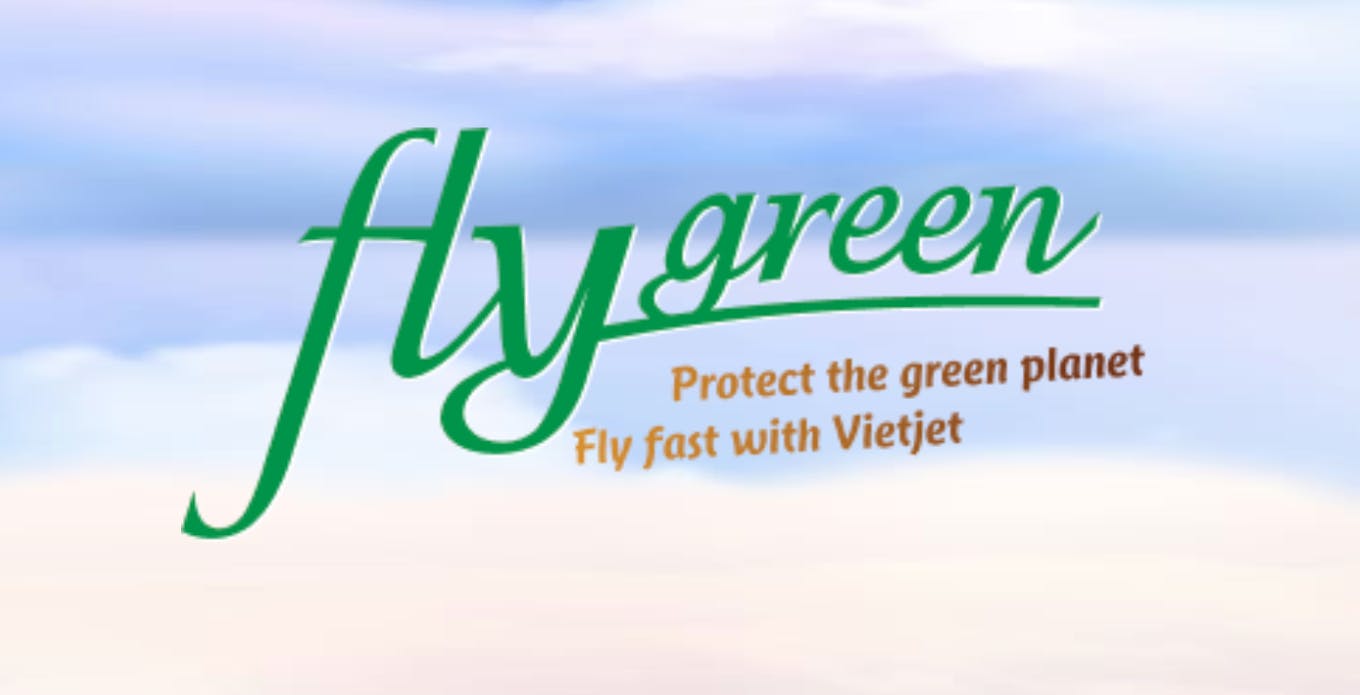A sales promotion for “eco-friendly” budget air travel has been banned in Singapore following a complaint to the city-state’s advertising watchdog that the campaign was misleading and constituted greenwashing.
To continue reading, subscribe to Eco‑Business.
There's something for everyone. We offer a range of subscription plans.
- Access our stories and receive our Insights Weekly newsletter with the free EB Member plan.
- Unlock unlimited access to our content and archive with EB Circle.
- Publish your content with EB Premium.
Since last November, Vietnamese airline VietJet had been promoting up to one million “eco tickets” for as little as SG$86 (US$64) each in a “Green Friday” promotion to encourage Singapore travellers to fly to Vietnam in the new year.
The social media and public relations campaign has been removed after the Advertising Standards Authority of Singapore (ASAS) concluded that it breached the country’s advertising code by making the unqualified claim that flying with VietJet has a lower impact on the environment.

VietJet’s website claims that air travellers can “fly green” by using the airline. Image: VietJet
In a media release sent to journalists, the airline said the promotion was an opportunity for Singapore travellers to “contribute to a greener future” by choosing VietJet’s network.
The airline’s promoted green credentials were the fuel efficiency of its fleet and adoption of digital services like electronic tickets and online check-ins, which reduce paper and ink use.
VietJet uses mainly the Airbus A320 family of planes, which it describes as “modern, fuel-efficient and environmentally-friendly”. These narrow-bodied aircraft have curved wing tips, or “sharklets”, which the airlines says can reduce drag and save on fuel.
In its ruling, ASAS said it had interrogated VietJet’s supporting documents for its claims that it had cut fuel consumption and emissions by up to 20 per cent and 50 per cent, respectively, and found that these claims breached the first guideline of the Singapore Code of Advertising Practice – matters of fact.

VietJet’s social media campaign for “green Friday” offered flights from Singapore to Vietnam fo US$64. Image: VietJet on Facebook
The claims were specific to a particular combination of aircraft type and engine, which make up only part of the VietJet fleet, so “consumers could not be assured of realising the claimed reductions in fuel consumption and emissions”, ASAS chairman Bryan Tan said in a response to Eco-Business’s queries this week.
ASAS also said that terms such as “eco-friendly” are too vague to communicate VietJet’s sustainability credentials clearly to consumers without appropriate qualifiers.
The complaint made to ASAS, by Singaporean resident Tan Hang Chong, expressed concern that VietJet’s claim that it had a “modern, fuel-efficient fleet” compared to other airlines was questionable and masked the climate impact of budget air travel in Southeast Asia.
“The adoption of digital services like e-tickets and online check-ins is now a more ubiquitous practice among airlines. Hence the claim that VietJet’s services are more sustainable than other airlines may also require greater scrutiny,” he said.
ASAS’s ruling marks the second time it has advised for the removal of advertisements deemed unacceptable or misleading due to exaggerated sustainability claims. In 2023, an advertisement for electronics brand Prism+ was removed after ASAS concluded that the claim that energy-efficient airconditioners can “save (the) Earth” was misleading.
Greenwashing aviation
Airlines have taken a hammering for greenwashing [examples, including Vietjet’s claims, are included in Eco-Business’s annual roundup of brands called out for greenwashing in the Year in Review series] in recent years.
High-profile cases include Dutch carrier KLM being found to have breached European consumer law in making claims suggesting that flying can be sustainable. Litigation experts said that the ruling set a legal precedent that could have ramifications across the aviation sector.
Australian carrier Qantas was also called out for using terms like “acting sustainably” and “fly carbon-neutral” in its advertising. A Virgin Atlantic advertisement was banned in the United Kingdom for claiming that sustainable aviation fuel (SAF) had no environmental impact.
For now, there is no specific greenwashing law governing advertising in Singapore. ASAS, an advisory council under a non-profit consumer organisation, is an independent regulator for the advertising industry and handles complaints on misleading advertisements. Its guidelines do not carry the full force of the law.
In response to questions from Eco-Business about the company’s claim that it was providing “eco-friendly” air travel, VietJet argued that it incorporates “eco-friendly materials both onboard (its aircraft) and throughout operational and service processes”.
The airline clarified that in its “Green Friday” campaign, it was mainly referring to the use of SAF in its flights, which it said can reduce carbon emissions by up to 80 per cent compared to traditional fuels.
To date, the airline has completed two SAF-powered flights, one to Melbourne, and another to Seoul, in October this year. Using SAF accounts for 65 per cent of VietJet’s progress towards achieving its 2050 net zero target, the airline has said.
The company added that it “advocates for” the use of “environmentally-friendly materials”, such as bamboo utensils, on its business class flights.
It did not state how many tickets it had sold in the sales promotion, nor if it would take further action to address public or consumer concern following ASAS’s ruling.
VietJet’s marketing was flagged for greenwashing in 2020, when the airline was called out for promoting half-price flights to Vietnam with the slogan “enjoy flying green with Vietjet”.
Environmental claims such as “carbon neutral”, “natural”, “eco” or “environmentally-friendly” are to be banned from use in advertising without verification in the European Union by 2026 in a bid to crack down on greenwashing.
Aviation, which is among the hardest sectors to decarbonise, accounts for 2.5 per cent of annual global carbon dioxide equivalent emissions, although that proportion is projected to grow in line with rising demand, particularly in developing economies. Vietnam is the world’s fifth fastest-growing aviation market, and is expected to reach 150 million air transport passengers by 2035, according to the International Air Transport Association.








